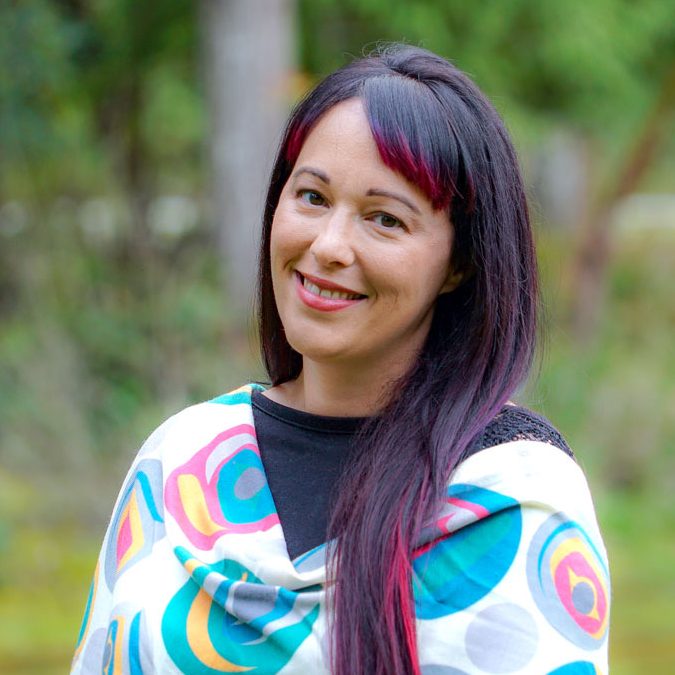
Jennifer Grenz
Assistant Professor, Applied Biology (joint appointment with Forestry)
Room 2213, Forest Science Centre, 2424 Main Mall
University of British Columbia (2020), PhD Integrated Studies in Land and Food Systems
University of British Columbia (2004), B.Sc AgroEcology
My research program is focused on the application of an Indigenous worldview to Ecology and Invasion Biology and is reflective of my two decades of experience in science communication, providing consulting services and on-the-ground management of invasive species for all levels of government, and working with Indigenous communities on creating food security plans and land healing initiatives.
My primary interest is in the exploration of how we can use a relational worldview to think differently about our role in the ecosystem in the context of a changing climate to develop solutions that ensure adaptability and bring us closer to ecological reconciliation. My current projects involve studying the soil microbiome and seed ecophysiology of invasive species and traditionally important plant species and bridging agrarian and traditional food systems through the reclamation of traditional land stewardship practices. As an Indigenous scholar (I am a Nlaka’pamux woman of mixed ancestry whose family is from the Lytton First Nation), I am interested in pursuing work that applies Indigenous research methodology, helps to blaze trails to create space in academia for Indigenous scholarship in the sciences, and helps our allies to be the best they can be.
Grenz, J. B. (2020). Healing the land by reclaiming an Indigenous ecology : a journey exploring the application of the Indigenous worldview to invasion biology and ecology (T). University of British Columbia. Retrieved from https://open.library.ubc.ca/collections/ubctheses/24/items/1.0394715
Clements, D. R., Larsen, T., & Grenz, J. (2016). Knotweed management strategies in north america with the advent of widespread hybrid bohemian knotweed, regional differences, and the potential for biocontrol via the psyllid aphalara itadori shinji. Invasive Plant Science and Management, 9(1), 60-70. doi:http://dx.doi.org/10.1614/IPSM-D-15-00047.1
Gillies, S., Clements, D. R., & Grenz, J. (2016). Knotweed (fallopia spp.) invasion of north america utilizes hybridization, epigenetics, seed dispersal (unexpectedly), and an arsenal of physiological tactics. Invasive Plant Science and Management, 9(1), 71-80. doi:http://dx.doi.org/10.1614/IPSM-D-15-00039.1
- 2018-2020: Federal Government of Canada, SSHRC Doctoral Award
- 2018-2020: University of British Columbia, Four Year Fellowships Tuition Award
- 2020: University of British Columbia, President’s Academic Excellence Initiative PhD Award
- 2019: UBC Nominee for SSHRC Talent Award
- 2019: 2nd Place Oral Presentation Competition, Faculty of Land and Food Systems Graduate Student Conference
- 2017: University of British Columbia, Cordula and Gunter Paetzold Fellowship
- 2016-2017: University of British Columbia, Aboriginal Graduate Fellowship
- 2014: Presidential Award 2014. North American Invasive Species Management Association.
- 2013: Service Award. North American Invasive Species Management Association.
- 2012: Outstanding Board Member. North American Invasive Species Management Association.
- 2004: Environmental Stewardship Award. Horse Council of BC.
- 2021: Associate Editor, Environmental Science & Policy
- 2021: Multidisciplinary Panel Member, Full Proposal Stage- New Frontiers in Research Fund (NFRF)- Exploration Competition 2021. Social Sciences and Humanities Research Council of Canada.
- 2021: Council of Canadian Academies (CCA) Expert Panel Reviewer of report on Managing Plant Health Risks in the Canadian Context.
- 2020: Committee Member, Letter of Intent Stage Multidisciplinary/Multisectoral Review Panel- New Frontiers in Research Fund (NFRF)- Transformation 2020 inaugural competition. Social Sciences and Humanities Research Council of Canada.
Tagged with: Faculty